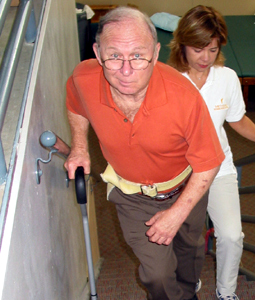JACKSON, Miss.—It has been 18 months since Dr. Faser Triplett suffered a severe stroke, but the retired Jackson physician continues to improve.
His success illustrates an exciting discovery that is sparking optimism in the rehabilitation field. Contrary to long-held beliefs, studies are showing that the brain has the capacity to rewire long after a stroke or injury.
“It has recently been proven that you can reactivate existing, but silent, brain connections and make new connections,” said Dr. Dobrivoje Stokic, director of the Center for Neuroscience and Neurological Recovery (CNNR) at Methodist Rehabilitation Center in Jackson. “So rehabilitation should not be considered only a short-term goal.”
World-renown clinician and National Institutes of Health researcher Dr. Leonardo G. Cohen will share some of the latest findings on the brain’s ability to recover function at a noon lecture on Nov. 11 at Methodist’s Conference Center.
Cohen, who is chief of the Human Cortical Physiology Section of the National Institute of Neurological Disorders and Stroke, will discuss how the findings may influence future therapies for stroke and brain injury patients.
The subject is of special interest at Methodist, where CNNR research also is focused on improving outcomes for brain injury victims. “Our goal is to compare whether the known mechanisms described for people who have had strokes also hold true for people with traumatic brain injuries (TBI),” Stokic said. “Dr. Cohen will be updating us on the most recent findings, helping us to understand recovery after TBI.”
Meanwhile, patients like Triplett are already seeing the results of participating in long-term therapy. He says his time at Methodist Rehabilitation Center is “the most wonderful thing that could have happened to me.”
“You get bright young people who are constantly evaluating what you are doing right and what you still need to be doing. If you really want to do things for a stroke survivor, they ought to be at Methodist. There’s nothing like it in the state.”
Triplett said when he first transferred to Methodist Rehab’s dedicated stroke unit in May, 2001, he couldn’t even turn over in bed. “It affected my left side and I couldn’t stand up, walk or use my left arm.”
Today, Triplett walks with a cane, drives and never misses his twice-a-week therapy sessions at Methodist’s outpatient rehabilitation center in Flowood. There, Methodist occupational therapist Peggy Kelly and physical therapist Teresa Swyers are working with him to improve his fine motor skills and advance his walking abilities.
“Our goal is to help him return to the activities he participated in prior to his stroke,” Swyers said.
Triplett has already returned to his duties as chairman of the board of Mississippi Medical Assurance Company. And he stays busy with other pursuits, including encouraging other patients who are new to the rigors of rehab.
“When I was in rehab a gentleman who had a stroke three years ago came and talked to us and he was such an inspiration. I told myself if I made it I was going to return as much as I could to people who had strokes, too. I try to tell them how important rehab is and how important it is to work away from rehab.”
Swyers and Kelly said it’s that willingness to do his “homework” that has helped Triplett improve. “He does everything we tell him to do and even comes up with his own activities,” Kelly said.
And she believes that’s how other stroke patients could continue to make gains long after the standard year of recovery. “I tell people a year is typical, but you may not be typical. That’s why it’s important to follow through at home.”
For information or to register for Dr. Leonardo G. Cohen’s lecture at Methodist Rehabilitation Center, call Martha Patterson at 601-364-3550.

